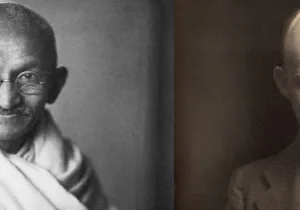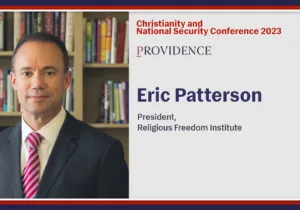Dear Professor Niebuhr:
United Nations World is planning a series of articles on “The World I Would Like to Live In.” Their purpose is to project both imaginatively and realistically the future toward which human society in general and American society in particular should progress.
Written by eminent thinkers in various fields, the articles will — we hope – outline with the warmth of personal touch a world seemingly far away but, perhaps, closer than we think. This would be a world in which the authors aspirations and ideals have been fulfilled and thrive as a matter of conviction and common sense. We are confident that the propositions and guiding ideas contained in these imaginative pieces will go far in enlightening and inspiring our readers, among whom we are proud to number some of the most thoughtful people in this country. We think it is imperative to try and break through the pessimism and feeling of helplessness of the present, and provide a psychological — and almost physiological — uplift by restoring faith in man’s infinite capacity for progress.
The projected list of our authors includes you, Whitney Griswold, Justice William Douglas, Adlai Stevenson, Bertrand Russell, Arnold Toynbee, and a few others.
Our articles will run between 2,200 and 2,400 words. We are offering $150.00 to our authors: our maximum fee. If possible, we would like to receive the manuscripts by April 1.Early confirmation of your acceptance will be gratefully appreciated.
All of us here hope sincerely that you will agree with us on the interest and importance of this project and on the great need for the kind of leadership this serial would provide.
I await your answer with anticipation.
Respectfully yours,
Tibor Koeves
[Tibor Koeves’ response to Niebuhr’s submission]
Dear Professor Niebuhr:
First of all, I must apologize for the long delay in my answer. To be quite frank, it was caused by the hesitant reaction of our editors to your article, “The World I Would Like to Live In.”
There is no doubt, of course, that your manuscript, as every Niebuhr manuscript, is a thought-provoking piece written with masterly insight into the chief problems of our society. However, reluctantly enough, we have come to the conclusion that it does not serve our purpose because it fails to conform to the pattern which we have asked our contributors to follow.
Perhaps you will remember that in my first letter I outlined the subject, the scope and the atmosphere of this series of articles. According to this outline, we expected to receive a contribution, painting vividly and imaginatively, life in a future and more perfect society. Instead, however, the overwhelming portion of your manuscript contains analysis and criticism of today’s world.
Such an approach is disappointing from our point of view, for the purpose of these contributions was a change of pace in our magazine. We felt that our heavily political book needed a kind of a lift away from these troublesome days. By dwelling to a large extent with current problems, however elevated its view may be, your otherwise splendid article unhappily fails to perform the function which we specified. And so, to my profound regret, and not without a measure of embarrassment, I have no choice but to return your essay.
Yours very sincerely,
Tibor Koeves
[Niebuhr’s response to being rejected]
Dear Mr. Koeves:
I am naturally disappointed in your letter and the return of the article, which in my opinion rather violates all standards to which I have been accustomed in my dealing with Journals. I wrote the article at your request and according to your specifications, except of course that I do not seem to have arrived at the optimistic conclusions which your letter now implies. If you really wanted that kind of optimism I don’t quite understand why you asked me to write it, for you must have known that I am a rather consistent critic of the kind of utopianism that takes flight into idealistic visions of the future, without regard to present realities. What I tried to do was to picture a future that had some relevance to the present. If you don’t like it, that is of course the end of the matter, except that I am naturally disturbed by the return of a requested article many months after I had delivered it.
Sincerely yours,
Reinhold Niebuhr
[Niebuhr’s rejected essay]
The editor has requested a group of contributors to bare their secret wishes and define “the kind of world I would like to live in”. I shall interpret this assignment to mean that we state our hopes with mature moderation, that is, that we do not let our fancy run free and project everything that our hearts may desire; but that we relate our hopes to the realities and define only those hopes which have some chance of fulfillment in the light of realities. It is the characteristic of a mature imagination in distinction from childish fancy or the fantasies of the abnormal, that it projects hopes and wishes with some consideration of the possibility of their fulfillment, while the childish and the psychotic let their fancy run free in the projection of fantastic wishes.
Our generation has not been particularly mature in looking into the future. There is a strong utopian strain in the thought of our culture. It is therefore the more important to observe the canons of mature soberness. Our first hope must be concerned with the peace of the world; for the peace and order of our community is the basis of every other form of happiness. It is significant that we should be anxious about the prospects of peace: for our generation, holding the promise of many good things to come, finds all prospects overcast by the menace of a possible atomic war in global dimensions. All the technical advances, which we trusted so implicitly, to guarantee the future for us have created a potential world community.
But we live in anxiety and insecurity while we wait for the potential to be actualized. In speculating about the possibility of the actualization of community in global terms we must take account of two forms of reality which threaten the realization of our hopes. The one represents all those factors and tendencies in human nature which abide changeless amidst historical changes; for while it is a fact that human nature is infinitely malleable, this fact must not obscure the perennially stabler forces in human nature. Thus, for instance, modern technics do enlarge the human community indeterminately, but they can not change the fact that men give their primary loyalty to the intimate communities of family and nation. This fact means that larger communities, constructed as artifacts of statesmenship, are subject to the stresses and strains of conflict and tension between the more partial and parochial communities which are rooted in nature. The other category of reality with which we must come to terms consists of the very technical advances which stand in seeming contradiction to the perennially stable forces in human nature. Technical advance has achieved a position of ineluctable fate for our generation; it proceeds above and beyond human wishes and desires; we therefore must ask the question at every turn, not whether some historical development is desirable, but whether a desirable development is possible within terms set by the fateful advancement of technical power.
If we return now to the problem of the prospects for world peace in the light of the two realities, we must come to the conclusion that while the realities rule out developments in which many people put their trust, such as the organization of a constitutional world order, they do not by any means destroy the hope of peace. A realistic version of such a hope must, however, put special emphasis upon the role of our nation In the establishment of peace. Abstract schemes may obscure, but they can not annul, the fact that our nation has a fantastic degree of economic power. Therefore future prospects depend to a large degree upon the ability of this nation to exercise its power In the alliance of free nations with such wisdom and moderation, with such imagination and patience, that the free world will be and remain strong and united, and capable of living on the edge of catastrophe without losing our nerve and inviting disaster by ill-considered actions and policies. It is slightly speculative to affirm that we have the capacities required for this difficult assignment; for we have been vaulted into a position of leadership without an adequate period of apprenticeship. But it is not fanciful to predict that we will not fail; for we have given some telling proofs of our growing maturity. We are fated to play the part in the international community which the Romans exercised in the ancient world. Our domain is larger and our task more difficult than theirs; for the modern communist enemy is more formidable than the Gothic hordes who challenged the Pax Romana; but our task is not impossible. We have a good chance of success in it.
The prospects of peace depend upon another contingency about which predictions may be hazardous but hopes need not be fantastic. Peace requires the gradual disintegration of Soviet power without a world war. Our encounter with the Nazis established the fact that a modern tyranny, holding a monopoly of power and wielding technical instruments of terror and force, is not easily dislodged. The Nazis were not brought low before they had engulfed all of us in disaster. But there are some significant differences between the two forms of tyranny which justify moderate hopes that the communist tyranny will disintegrate without Involving us in war. The first difference is that, while communists are not adverse to overt conflict, their situation does not fatefully drive toward military adventure. They are by nature a conspirational political group, rather than a military formation; their dogma anticipates their ultimate triumph through what they regard as the “inner contradictions” of the social order of their opponents. They are bound to be cautious with military ventures while they wait for triumph through what they regard as the “dialectics of history.”
The other difference is that their dominion is more widely spread than the Nazi tyranny. In this dominion outraged national pride among subject peoples offers the motive for revolt; and centers of national power furnish the fulcrum for such a revolt. The human relations of such a tyranny are so dismal and corroding that one has a right to hope that the system will break down under the weight of resentments which must be the consequence of the pride and the arbitrariness of the rulers of this vast dominion. The communist rulers have proved, at first with their encounter with Tito; and more recently in the Czech trials, that they are incapable of considering or respecting the national sentiment of the satraps of their dominion. Their iron rule must therefore bear within it the seeds of its own destruction. They may become panicky at the first signs of defection in the outer fringes of their dominion, and they might precipitate a war in the hour of hysteria, but they may have such little prospects of success for a final venture that cool calculation may outweigh the hysteria in such moments of future crisis. The greatest danger of war probably derives from the fact that they survey our world through the spectacles of an inflexible dogmatism; they are therefore bound to misinterpret our social realities. They will be the more prone to do this because in a tyrannical system the proconsuls are more and more afraid to tell the truth to those who are in the remote center of power where lack of contact with the far flung realities enables dogmatic fantasy to have free reign. These are genuine hazards to the attainment of peace; but they are not insuperable. There is still a good prospect of avoiding catastrophe and establishing a stable world order. But peace is only the most basic prerequisite of the good life. We must fill the peaceful condition of the world with contented and creative activity to make life worth living.
On the positive side our primary problem is to make life meaningful under the conditions set by modern technics. This is a problem because technics tend to destroy the organic relations of life, to standardize and vulgarize culture, and to create a tendency of preoccupation with the physical comforts and gadgets to the exclusion of profounder concerns. These are serious problems. We in American who have gone farthest in technical advance and have been the first to entertain, and sometimes to succumb, to the characteristic temptations of a technical age, have a chance also to be the first to overcome these temptations and to build a viable post-technical civilization. This involves the rediscovery and reclamation of some truths and insights of the past which we have been too hasty in discarding.
One of the ironies of our age is that a technical civilization is constantly tempted to violate the “dignity” of the individual, which our democratic culture ostensibly extols. We do this not only by standardized forms of culture which allow for no individual initiative; and technical forms of community which permit no mutual personal accord; and plans for manipulating human nature as if persons were objects in nature which could be beguiled to seek “socially approved ends” by the proper technics. We need a reaffirmation of the dignity of the individual which is based upon the Christian and Jewish faiths; understanding of the individual, who is not thought of as fitting into a system of nature or of reason, but is seen in a dramatic encounter with God and his fellow men. Such a faith calls attention to the heights of mystery which envelope the individual in the pinnacles of his existence; and guard his essential freedom by seeing his will as an unpredictable and not fully determined agent of human history. Schemes which reduce human history to some simple system of rational intelligibility equate history too much with nature and rob human beings of their essential dignity.
Our culture talks endlessly of applying the methods of science, which have served us so well in the conquest of nature to the conquest of human nature. Meanwhile, the real problem of our culture is that we have applied these methods, not less rigorously, but too consistently, to the human scene and have obscured the uniqueness of man. The rediscovery of that dimension of human existence which proves the individual to partly transcend the social and historical process in which he is partly an agent and partly a creature, will also serve to solve the problem of modern man’s excessive preoccupation with the fruits of technical efficiency. He will learn that life consisteth not “in the abundance of things a man possesseth” and will reclaim that contentment and freedom from hysterical striving after more and more wealth and power, which is the fruit of a life which lives in a world of abiding values, transcending the obvious rewards of man’s conquest of nature. Man is obviously an amphibious creature who must conquer the forces of nature to lay the basis for the life of the spirit. There is no guarantee of virtue in the poverty of the Oriental cultures who have been deficient in technical efficiency. But preoccupation with the physical goods of life is obviously as destructive of true contentment as the want of them. There must be a spiritual emancipation from the goods of life if a technical civilization is not to be inundated by mere things, and man is not to be debased into a mere Homo Faber.
Modern technics create another hazard which must be surmounted in the interest of the true culture. The technics of mass communication have made the fruits of the arts available to all men and have thus lifted the whole level of culture. But these same mass communications, whether in movies, radio, and television, tend to vulgarize the arts by reducing every form of art to the least common denominator where it will be acceptable to the widest possible audience. Some of the tendencies toward vulgarization may be permanent, but many are the consequence of inexperience. Cultural vitality will in time assert itself and make the mass communications genuine instruments of the treasuries of the spirit. This is at least a goal for which we must strive, and there are no insuperable obstacles in the way of their achievement.
We have come into the domain of technical power so recently and have believed so uncritically that technical advance would solve all our problems, that we may be ill prepared to accept the fact, expressed by the great Italian philosopher, that we must reclaim almost every dimension of human liberty from a civilization dominated by technics which our fathers won from nature. We must reclaim the liberty of social spontaneity from a society standardized by technics. We must reclaim the liberty of mutual personal human relations from a community integrated by technic. We must gain the liberty of artistic creation in a civilization of mass communications. Above all we must assert the liberty or man against every tendency to debase him into an instrument of a social process. Thus some of our problems are to realize community under conditions set by technics: and other problems are to reclaim our liberties against tendencies inherent in a technical civilization. The tasks are formidable but not impossible of achievement, but we must know what the problems are and recognize that the overt communist enemy to the good life is only one obstacle to the achievement of our goal. The covert peril is to be found in the conditions of a technical civilization.






 Sponsor a student for Christianity & National Security 2024
Sponsor a student for Christianity & National Security 2024